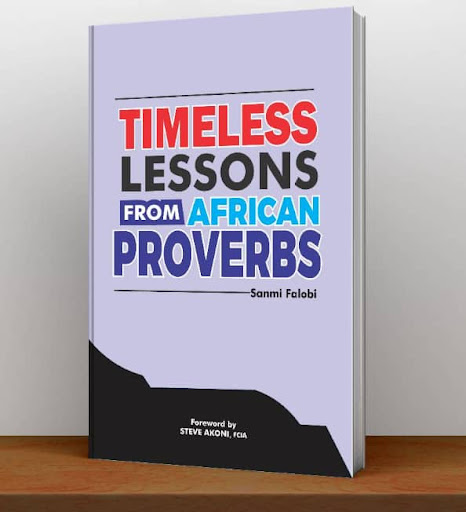Boot Title: Timeless lessons from African proverbs
Author: Sanmi Falobi
Publisher: Inmate Communications
Pages: 94
Reviewer: Azeezat Adeshola
Sanmi Falobi’s Timeless Lessons from African Proverbs is more than a book, it is a journey into the soul of African wisdom. As someone who grew up hearing proverbs casually dropped in conversations by elders, the collected proverbs are both familiar and revealing. The book bridges tradition with contemporary insight, showing how age-old sayings still carry answers to today’s questions.
The book is divided into 20 chapters, each introduced with a proverb, followed by its meaning, explanation, and context. From Wisdom and Knowledge to Spirituality and Integrity, the themes are explored in a way that is simple, reflective, and rich with cultural relevance.
One of the proverbs that stood out to me is from the Relationships and Friendships chapter: “The one who loves you does not run away.”
This line alone carries emotional weight. The explanation given shows that love and friendship should be proven through presence, not absence. A true friend or partner doesn’t flee at the first sign of trouble, he or she stays, grows, and supports. In a time when people often ghost or give up on relationships, this proverb becomes a mirror. It made me reflect on my own friendships and how many I have lost not because of disagreement but because of avoidance. Falobi’s real-life application here felt like a nudge towards being present and intentional in how we love.
Another thought-provoking chapter was Patience and Perseverance, where he writes: “Even the best cooking pot will not produce food without a little fire.”
READ ALSO: President Tinubu and June 12, By Tunde Rahman
This proverb reminded me that talent without effort is wasted. I connected this directly with my academic journey, where I have come to discover that potential is not enough, but consistency and pressure (the fire) create results. The message was both encouraging and grounding.
This book does not just teach, it reflects who we are and who we can be if we listen to the proverbs that shaped our roots.
Falobi also does not shy away from deeper issues. In Life and Death, he presents the proverb: “The reality of death gives value to the essence of life.”
It is a sobering reminder that mortality should inspire intentional living. It encourages readers to value time, relationships, and impact, because none of it is forever. In a world obsessed with speed and noise, this chapter is a quiet call to meaning.
One of the most striking proverbs in the chapter on Truth and Integrity is: “A man who has not learned to dance blames the drum.”
It addresses the human tendency to shift blame instead of facing personal flaws. I found this chapter painfully honest, especially in a society where accountability is often missing. It teaches that progress begins with self-awareness and responsibility.
While the structure – Proverb, Meaning, Explanation, Context – is helpful for clarity, I sometimes wished for more storytelling or cultural anecdotes. As someone who learns better through repeated reading and visual examples, a few parts felt too brief or direct. Readers like me may have to pause and reread to fully absorb the meaning. Still, perhaps this brevity is intentional, to leave space for personal interpretation, self-reflection, and dialogue.
Timeless Lessons from African Proverbs is a powerful blend of heritage and guidance. It speaks to individuals, families, leaders, and communities. As a young Nigerian navigating adulthood, this book grounded me in the values I want to carry forward – truth, strength, humility, and love. I highly recommend it to anyone seeking wisdom rooted in culture, especially young Africans who want to reconnect with the philosophy of their people.
This book does not just teach, it reflects who we are and who we can be if we listen to the proverbs that shaped our roots. It is also, importantly, the preservation of the proverbs which reflect in part, the depth of African culture and tradition.














